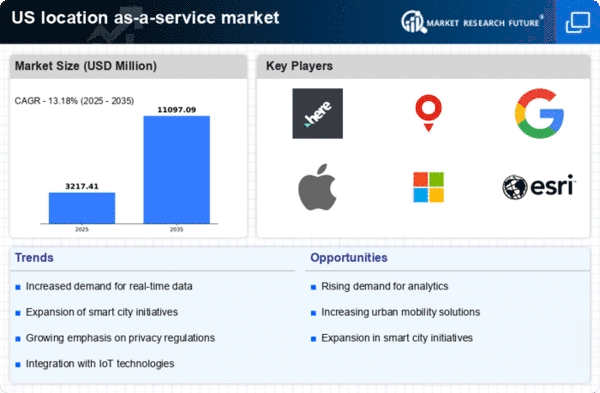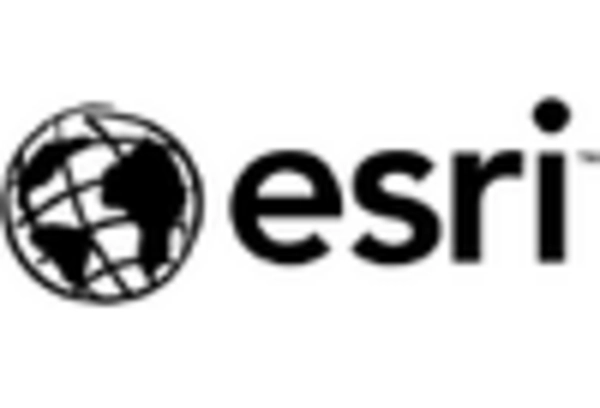Integration of IoT Devices
The proliferation of Internet of Things (IoT) devices is significantly influencing the location as-a-service market. As more devices become interconnected, the demand for location-based services that can track and manage these devices is increasing. In the US, it is estimated that the number of IoT devices will exceed 30 billion by 2025, creating vast opportunities for location as-a-service providers. This integration allows businesses to optimize their operations, improve asset tracking, and enhance customer engagement through personalized services. Consequently, the location as-a-service market is likely to expand as companies invest in IoT-enabled solutions.
Enhanced Mobile Connectivity
The advancement of mobile connectivity technologies, such as 5G, is playing a crucial role in the evolution of the location as-a-service market. With faster data transmission speeds and lower latency, 5G enables more accurate and efficient location-based services. This is particularly relevant for applications in urban environments, where real-time data is essential for navigation and location tracking. As 5G networks continue to roll out across the US, the location as-a-service market is expected to benefit from increased adoption of mobile applications that leverage these capabilities. Businesses are likely to invest in location services that can take full advantage of enhanced connectivity.
Focus on Operational Efficiency
The drive for operational efficiency is a significant factor propelling the location as-a-service market. Organizations are increasingly recognizing the value of location intelligence. Organizations are increasingly recognizing the value of location intelligence in optimizing their operations, reducing costs, and improving decision-making processes. By utilizing location-based analytics, businesses can gain insights into customer behavior, resource allocation, and market trends. In the US, companies are projected to invest heavily in location analytics solutions, with the market expected to grow at a CAGR of around 20% over the next few years. This focus on efficiency is likely to lead to greater adoption of location as-a-service offerings, as organizations seek to harness the power of location data.
Rising Demand for Real-Time Location Data
The location as-a-service market is experiencing a notable surge in demand for real-time location data. Businesses across various sectors, including retail, logistics, and transportation, are increasingly relying on accurate location information to enhance operational efficiency and customer experience. According to recent estimates, the market for real-time location services in the US is projected to reach approximately $10 billion by 2026, reflecting a compound annual growth rate (CAGR) of around 25%. This growing need for precise location data is driving innovations in the location as-a-service market, as companies seek to leverage advanced technologies to provide timely and relevant information to their users.
Growth of E-commerce and Delivery Services
The rapid expansion of e-commerce and delivery services is a key driver for the location as-a-service market. With online shopping becoming a staple for consumers, businesses are increasingly utilizing location-based services. With online shopping becoming a staple for consumers, businesses are increasingly utilizing location-based services to streamline logistics and improve delivery efficiency. In the US, e-commerce sales are projected to surpass $1 trillion by 2025, prompting retailers to adopt location services to enhance their supply chain management. This trend not only facilitates faster deliveries but also allows businesses to provide customers with real-time tracking information, thereby improving overall satisfaction. As a result, the location as-a-service market is poised for substantial growth.
















